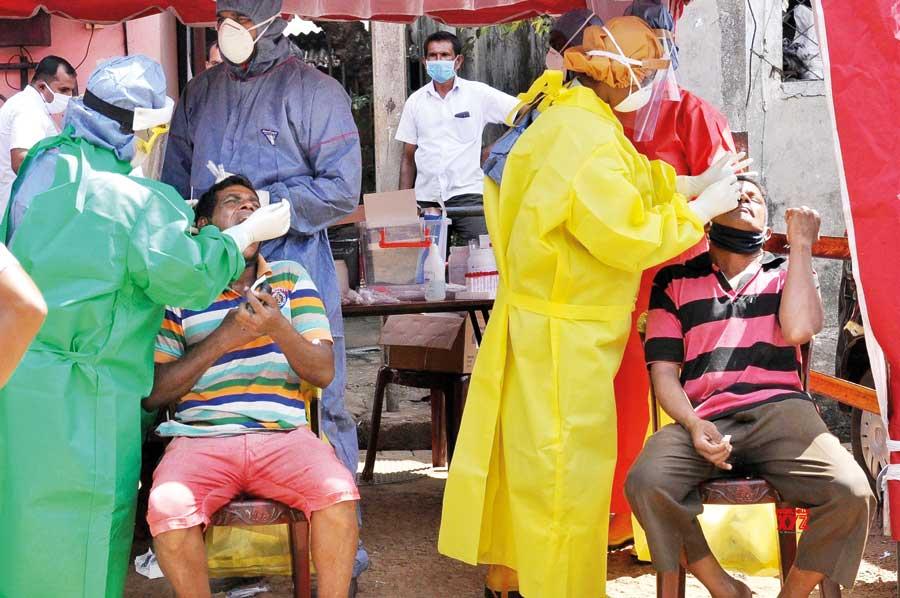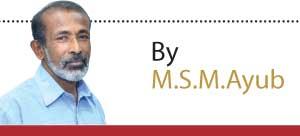Reply To:
Name - Reply Comment

Critics and Western medics point out that a native medicine like what Bandara has produced should be promoted only after its efficacy is proved in combating the present Coronavirus
- Over 5000 people who had thronged at his shrine on Tuesday, disregarding health instructions
- It has been found that the medicine has totally cleared their bodies of the coronavirus.
- The Ayurveda Department has approved Bandara’s potion as a supplementary food, but not as a drug for the pandemic.
- Clinical trials have been carried out for this potion at the Watupitiwala COVID-19 Treatment Centre led by a team of Western medical doctors.
- At the same time promoting the product, especially by the State is similarly counterproductive, before the syrup is scientifically proved to be successful
The Government of Sri Lanka (GoSL) seems to be in extreme desperation in dealing with the current  COVID-19 pandemic, going by the unofficial recognition and promotion awarded by the pro-government politicians and media to what is called an indigenous medicine that is said to have the capability to cure the deadly disease, that has already claimed over 69 million lives world over.
COVID-19 pandemic, going by the unofficial recognition and promotion awarded by the pro-government politicians and media to what is called an indigenous medicine that is said to have the capability to cure the deadly disease, that has already claimed over 69 million lives world over.
The potion that has been developed by Dhammika Bandara of Hettimulla, Kegalla has already been tasted publicly by Health Minister Pavithra Wannaiarachchci and distributed among over 5000 people who had thronged at his shrine on Tuesday, disregarding health instructions issued in view of the epidemic.
Also it is said that the medicine had been successfully administered to patients who had volunteered at the COVID-19 Treatment Centre at Watupitiwala and media reported that it has been found that the medicine has totally cleared their bodies of the coronavirus.
However, Deputy Director General of Health Services Dr. Hemantha Herath had told the Daily Mirror on Tuesday that the Drug authority or the Food Authority of the Health Ministry hasn’t recognised the product. A group of experts under the chairmanship of Professor Senaka Pilapitiya has been appointed on December 2 by the Health Minister to prepare proposals with regard to researches that have to be carried out on the medicine. Also the Ayurveda Department has approved Bandara’s potion as a supplementary food, but not as a drug for the pandemic.
People are wary of this local medicine because of stories as to how Bandara has obtained the knowledge to prepare the medicine and his past. Social media is crammed with stories insulting and making fun of the man and his potion. They question his credentials and that of his medicine. He is neither hailing from a family practising traditional indigenous medicine nor a person studied in a recognised college of indigenous medicine, they said. He is said to be a mason by profession and running a devala. However, as far as the indigenous medicine is concerned, these facts do not disqualify a person to be an indigenous doctor.
Yet, the question remains as to how Bandara got his knowledge on the medicine eight months after the deadly virus started to invade the country. State Minister of Indigenous Medicine Sisira Jayakody who is in forefront in promoting Bandara’s medicine has said that clinical trials have been carried out for this potion at the Watupitiwala COVID-19 Treatment Centre led by a team of Western medical doctors. PCR tests reportedly have confirmed that the virus was not present in patients who had consumed the syrup for three days.
The latest reports say that Kegalla District Secretary has stopped the distribution of the Bandara’s syrup after large crowds flocked to his shrine to get bottles of syrup on Tuesday disregarding health instructions. The scramble had raised concernes of the authorities and fears were expressed of a new cluster of COVID-19 which some people preferred to call “Peni Pokura”
It is unfair by the person who claims that the potion has already cured several people who had been infected with corinavirus to describe him as a conman, before his product is proved to be worthless in controlling the disease. At the same time promoting the product, especially by the State is similarly counterproductive, before the syrup is scientifically proved to be successful in containing the virus.
Many indigenous medicines are produced with empirical knowledge and evidence and not based on scientific research. They prove their effectiveness in practice. Hence, one cannot rule out the efficacy of such a medicine right away. Ayurvedic and Sri Lankan indigenous medicines have been effective in curing so many ailments for centuries. Yet, a drug for a disease like COVID-19 which has already claimed 69 million lives across the world should be promoted only after its efficacy is proved, because people might lose their vigilance over the pandemic and also the world is watching.
Many African countries and India have already tried their hands in containing the pandemic with their respective indigenous medicines. In April, Madagascar’s President Andry Rajoelina launched COVID- Organics (CVO) to great fanfare, saying it was a prevention and remedy. It had been tested on 20 people over a period of three weeks, according to him. The pictures that showed the distribution of Bandara’s syrup refreshed the memories of Madagascar’s Malagasy Institute of Applied Research (MIAR) which developed the herbal medicine called CVO distributing it to the people in that country. The MIAR had shipped the drug to several African countries as well. However, In August BBC reported that the CVO had failed in controlling the spike of COVID 19 in Madagascar.
Certain indigenous medicines in India too were told to have the capacity to control coronavirus and had the blessings of the Government of Prime Minister Narendra Modi. Health Minister Harsha Vardhan on October 6 released recommendations for prevention of COVID-19 based on Ayurveda. However, it had to meet with stiff resistance from the Indian Medical Association (IMA). The organization demanded Vardhan produce evidence of treatment’s efficacy and said that if he was unable to do so he was “inflicting a fraud on the nation and the gullible patients by calling placebos as drugs.” Recommending any drug without evidence for a deadly disease that has claimed more than 100,000 Indian lives is “a dangerous trend,” they had argued.
Sri Lanka is currently facing a crisis situation in respect of COVID- 19, as the number of new cases always surpasses the number of persons discharged from hospitals. The Government Medical Officers Association (GMOA) has been warning the authorities almost every day saying that the system would be overburdened very soon unless this trend is reversed. On the other hand the latest reports on various vaccines that are being developed by several countries are not encouraging.
The international media quoting campaigners such as Global Justice Now, Oxfam and Amnesty International said on Wednesday that nearly 70 poor countries will only be able to vaccinate one in ten people against COVID-19 next year unless urgent action is taken by governments and the pharmaceutical industry to make sure enough doses are produced. “Wealthier nations have bought up enough doses to vaccinate their entire population three times over by the end of 2021, if those currently in clinical trials are all approved for use. Canada tops the chart with enough vaccines to vaccinate each Canadian five times’ it was pointed out.
Therefore, authorities in countries like Sri Lanka attempting to find alternative escape routes are natural. But any remedy should be proved to be viable. Assisting efforts to find local remedies is also acceptable. However, State sponsored recognition and promotion for a syrup or a pill before the proof of its efficacy is known, might be dangerous, as the IMA pointed out.